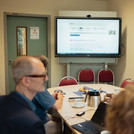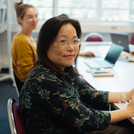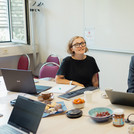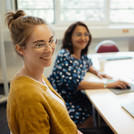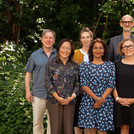Intercultural Communication: A Fruitful Visit for NILIC at the University of Potsdam
From July 16 to July 18, 2024, representatives from the Nottingham Institute of Languages and Intercultural Communication (NILIC)visited the University of Potsdam for a series of insightful meetings and workshops aimed at strengthening collaboration on projects about intercultural communication.
The visit commenced with the participation in the course "Memorable Speaking: Making an Impact." The session featured student presentations on possible intercultural projects they could imagine pursuing in their future careers. The NTU staff and students engaged in an extensive discussion about the content and presentation techniques. These discussions provided a unique moment of reflection for the students, enhancing their communication skills and intercultural understanding.
The second day featured a hybrid workshop involving participants from Espol (Ecuador), EDUC-Partner Masaryk U (MUNI CJV Language Centre), NILIC, and Zessko. The focus was on projects that support less-privileged communities, address the Sustainable Development Goals (SDGs), and develop intercultural competence among students. Key topics included the NILIC "ICCaW (Intercultural Communication at Work)" module, which drew significant interest from Espol; international student transition programs to assist graduate and postgraduate students in integrating into academic life; Teaching English to Speakers of Other Languages (TESOL) with potential collaborations with local charities and international universities; community engagement projects supporting refugees and asylum seekers, highlighting a successful program at Masaryk University for Ukrainian refugees; courses in multiple languages and a British Council project for materials development in China.
The final day featured two crucial panels. The morning session focused on the "DIASS (Developing Intercultural Academic Study Skills) program," set to launch in September 2024. This program aims to help international students transition into UK academic culture and prepare for the job market. Discussions revolved around aligning DIASS with existing programs, providing credits (microcredentials), and integrating it into the broader university framework. The afternoon session emphasized staff training in intercultural communication, including a pilot summer school for academic staff and potential collaborations for training resources. Discussions highlighted the importance of making the campus more inclusive and welcoming, with a focus on strategic goals like digital accessibility and supporting "internationalization at home." A joint presentation for the CercleS Conference in September 2024 in Durham was worked on.
Overall, the visit fostered a collaborative spirit, with participants sharing valuable insights and laying the groundwork for future joint projects aimed at enhancing intercultural competence and supporting diverse communities.
Contact: David James Prickett
Published on July 29, 2024

